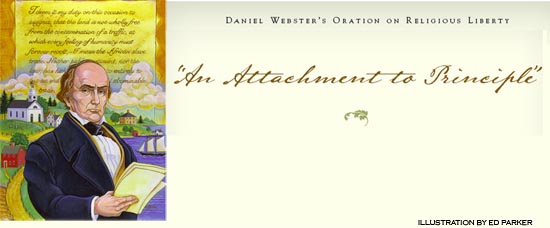An Attachment to Principle
Daniel Webster September/October 2008
Getting your Trinity Audio player ready...

We have come to this rock to record here our homage for our Pilgrim Fathers; our sympathy in their sufferings; our gratitude for their labors; our admiration of their virtues; our veneration for their piety; and our attachment to those principles of civil and religious liberty which they encountered the dangers of the ocean, the storms of heaven, the violence of savages, disease, exile, and famine, to enjoy and to establish.
And we would leave here, also, for the generations which are rising up rapidly to fill our places, some proof that we have endeavored to transmit the great inheritance unimpaired; that in our estimate of public principles, and private virtue; in our veneration of religion and piety; in our devotion to civil and religious liberty; in our regard to what-ever advances human knowledge, or improves human happiness, we are not altogether unworthy of our origin.
Power of the love of religious liberty
The love of religious liberty is a stronger sentiment, when fully excited, than an attachment to civil or political freedom. That freedom which the con science demands, and which men feel bound by their hopes of salvation to con tend for, can hardly fail to be attained. Conscience in the cause of religion, and the worship of the Deity, pre-pares the mind to act, and to suffer beyond almost all other causes. History instructs us that this love of religious liberty, a com pound sentiment in the breast of man, made up: of the clearest sense of right, and the highest conviction of duty, is able to look the sternest despotism in the face, and, with means apparently most inadequate, to shake principalities and powers.
There is a boldness, a spirit of daring, in religious reformers, not to be measured by the general rules which control men's purposes and actions. If the hand of power be laid upon it, this only seems to augment its force and its elasticity, and to cause its action to be more formidable and terrible. Human invention has devised nothing, human power has com passed nothing, that can forcibly restrain it, when it breaks forth. Nothing can stop it, but to give way to it; nothing can check it, but indulgence. It loses its power only when it has gained its object. If it be allowed indulgence and expansion, like the elemental fires it only agitates and perhaps purifies the atmosphere, while its efforts to throw off restraint would burst the world asunder.
Thanks be to God, that this spot was honored as the asylum of religious liberty. May its standard, reared here, re main forever! May it rise up high as heaven, till its banner shall fan the air of both continents, and wave as a glorious ensign of peace and security to the nations!
True principle of a free Government
The true principle of a free and popular government would seem to be so to construct it as to give all, or at least to a very great majority, an interest in its preservation: to found it as other things are founded, on men's interest. The stability of government requires that those who desire its continuance should be more powerful than those who desire its dissolution. This power, of course, is not always to be measured by mere numbers. Education, wealth, talents, are all parts and elements of the general aggregate of honor; but numbers, nevertheless, constitute ordinarily the most important consideration, unless indeed there be a military force, in the hands of the few, by which they can control the many.
Citizens to Restrain and Abolish Injustices
We are bound to maintain public liberty, and by the example of our own systems, to convince the world that order and law, religion and morality, the rights of con-science, the rights of persons, and the rights of property, may all be preserved and se cured, in the most perfect manner, by a government entirely and purely elective. If we fail in this, our disaster will be signal, and will furnish an argument, stronger than has yet been found, in support of those opinions which maintain that government can rest safely on nothing but power and coercion.
As far as experience may show errors in our establishments, we are bound to correct them, and if any practices exist contrary to the principles of justice and humanity, within the reach of our laws or our influence, we are inexcusable if we do not exert ourselves to retrain and abolish them.
From a discourse delivered by Daniel Webster before the Pilgrim society at Plymouth, Massachusetts, December 22, 1820, in commemoration of the first settlement of new England. Selections arranged by A.J.S. Bourdeau. Daniel Webster was recognized as a great orator and statesman in his time: serving as a senator, secretary of state, and running three times for the presidency of the United States of America. He tried to avert the nation from civil war. This excerpt was first printed in Liberty, vol. 9, second Quarter, 1914, pp. 53, 54.